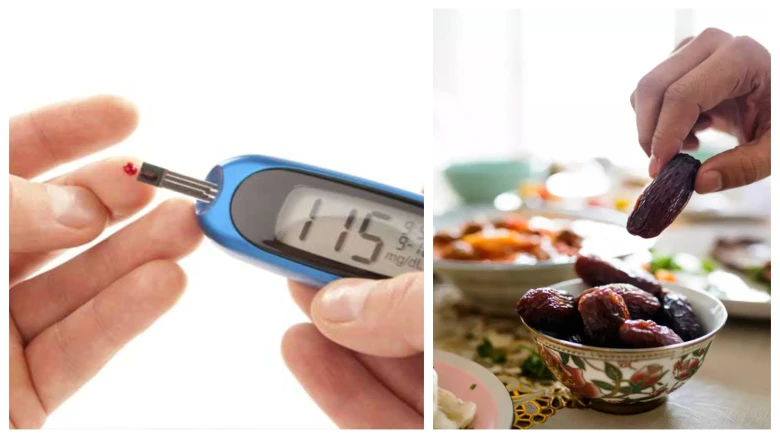National

Ramadan 2023: Ramadan, however, is a festival that includes much more than just food. It's a time for spiritual growth, reconnecting with one's faith, and being kind and...
Digital Desk: The most pious festival of the Islamic religion, Ramadan, is celebrated by Muslims across the country. The holy month starts on March 24 and end on April 21, and Eid-ul-Fitr would be celebrated on the evening of April 21 or 22. Muslims regard this month as an opportunity to revisit Prophet Mohammed's teachings.
Ramadan, however, is a festival that includes much more than just food. It's a time for spiritual growth, reconnecting with one's faith, and being kind and compassionate to others. In order to concentrate on your inner self instead of food or drink, you can also fast for 30 days from sunrise to sunset.
With Ramadan approaching and 'iftari' preparations in the minds, it's crucial to think about the best ways to support diabetics and those who care for them in fully celebrating the holiday. Navigating a fast can be difficult because it requires a major change in routine and way of life, which can make it difficult for people to maintain normal blood sugar levels throughout the day.
It can be very beneficial to consult your doctor before fasting in order to understand any risks and to have a plan in place to manage your diabetes as effectively as possible.
Dr Shehla Shaikh, Consultant Endocrinologist, Saifee Hospital, Mumbai said: "For people with controlled diabetes, there are steps they can take to manage their sugar levels, especially while fasting for long periods during Ramadan. There are several healthy eating habits people should follow for the periods between `sehri` and `iftar`.
Don't neglect to monitor your blood sugar during your fast; you can do this easily while on the go because there are now Continuous Glucose Monitoring (CGM) device options available in addition to traditional blood glucose meters that require finger pricking. It is also critical to follow the advice of one's doctor in order to understand any changes that may be needed with one's medication.
When it comes to managing diabetes while fasting, measures like time in range through a CGM monitor can be very helpful. The proportion of time that a person`s blood glucose levels are within a given range (typically 70 to 180 mg/dl) is known as the time in range.
A longer period of time in the target range is associated with more frequent blood sugar checks, which can help you maintain better glucose regulation and lower your risk of developing long-term health problems. One should attempt to be within range for roughly 17 of each day's 24 hours. Moreover, diabetics should keep a few key points in mind as they celebrate Ramadan.
Here are few tips to help you control your diabetes during Ramadan this year:
1. Eat an energy-boosting Sehri (pre-dawn) meal: Include more fibre-rich starchy foods that release energy slowly, such as oats and multigrain breads, brown or basmati rice, veggies, lentils (dal), and others. You can also get energy from proteins like seafood, tofu, and nuts. Drink plenty of fluids, but avoid sugary or extremely caffeinated beverages such as coffee, soft drinks, and others.
2. Monitor your blood sugar levels on a regular basis: Checking your glucose levels more frequently is essential, and there are more methods to do so in the comfort of your own home. Continuous Glucose Monitoring (CGM) wearable devices, such as the FreeStyle Libre, give people with diabetes an easy way to access real-time glucose readings and trends, such as while fasting or at Iftar. All of this while avoiding the discomfort of pinpricks associated with conventional glucose testing methods.
3. Properly replenish during Iftar (breaking of fast): The fast is typically broken with dates and milk, which can be followed by complex carbohydrates. Be mindful to hydrate yourself as well. Consume sweet, fried, or oily foods in limits, as these can be harmful to your health. Fruit before sleep can also help keep blood sugar levels stable until early morning.
4. Follow a gentle exercise routine: Continue to engage in physical activity, but reduce the intensity to prevent overexertion. Simple exercises, such as walking or yoga, are options. Resistance training can also help you prevent muscle loss and increase your strength during this period.
5. Sleep well: Adequate hours of sleep - of good quality - is essential for good health and well-being. Getting enough sleep is important, especially during Ramadan when your pre-dawn meal is important to maintain your energy levels. This also helps to prevent sleep deprivation, which can have an effect on your appetite. This can also help with digestion and blood glucose levels, which is important when dealing with diabetes.
In addition to following these recommendations, diabetics should be on the lookout for any concerning patterns of hyperglycemia or hypoglycemia and take immediate action. The key to this is devising a plan for what to do if your blood sugar levels are abnormally high or low during, before, or after fasting.
It's also crucial to follow your doctor's advice on how to maintain your blood sugar levels in the target range for at least 75 percent of the day, even when you are fasting.
Having a plan in place can help you control your health during Ramadan, even though some diabetics choose to fast during this holy month.
Leave A Comment